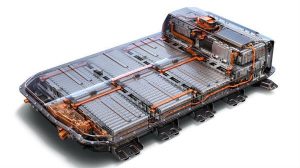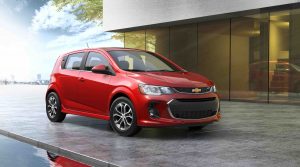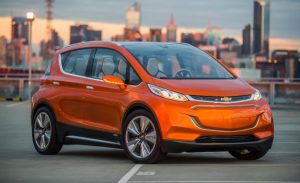People made fun of cars like the Vega and Chevette – but at least GM made money on them. And when GM stopped making money on cars like them, it stopped trying to sell them.
They got cancelled and replaced.
Profitability used to determine whether a car remained in production.
Of course, those were the Old Days – when the car business wasn’t a government-supported, politically-motivated crony capitalist enterprise, as it is today.
Today, profits don’t matter. Grotesque losses are embraced – probably because GM (and the rest of the industry) knows that the government – read, you and me – will eventually end up with the bill, so not to worry.
And so it is not a huge surprise to read that the financial services company UBS – doing a little due diligence, as it were – announced that GM is probably losing about $7,400 per “sale” of its new Bolt electric car. 
Better double that, UBS.
At least.
The finance guys at UBS say that about $9,000 of the Bolt’s $36,620 base price is accounted for by the “premium” incurred by its all-electric drivetrain; that is, by its battery pack, electric motors and peripherals. But that doesn’t quite add up: $36,620 less $9,000 is $27,620 – and that is a lot of money for the shell of a compact economy car . . . which is what the Bolt is, regardless of what’s under its hood.
A Chevy Sonic is basically the same thing – if you exclude the parts that make it go.
At 173.9 inches long vs. 164 inches long for the Bolt, it is actually a slightly larger car overall. Both cars have about the same room inside – the Bolt having slightly more backseat legroom (36.5 inches vs. 34.6 for the Sonic) and a bit more trunk space (16.9 cubic feet vs. 14.9 cubic feet for the Sonic).
Neither car is a luxury car. Neither one comes with heated (and 12-way powered) leather seats, carbon fiber trim, a full-length panorama sunroof or a 12-speaker ultra-premium audio system. The features one finds in cars with price tags pushing $40k.
But the Sonic’s base price is $15,145 – which $12,475 less than the alleged cost of the Bolt, once the “premium” of its electric guts is subtracted.
It doesn’t add up.
Other than its electric guts, there is nothing particularly special about the Bolt. It is not an opulently fitted out car.
It is just priced like one.
True, it has a larger LCD touchscreen than the Sonic comes standard with (10.2 inches vs. 7 inches) and it rolls on 17 inch vs. 15 inch wheels. Its standard stereo has six rather four speakers and the Bolt has climate control AC rather than manual control AC.
But none of that is fancy stuff and doesn’t account for a $12,475 price spread.
At most, the nominal upgrades just described might add $2,000 to the price of a car. We are still $10,000 apart.
Actually, we are $21,055 apart.
That is the true differential between the $36,200 Bolt and a $15,145 Sonic – and it is the sum any sane person would take into account when considering the two vehicles. Unless economic considerations no longer apply. In which case, why not just build every man, woman and child in America his or her own personal pyramid, Khufu style?

So what do you get for the additional $21k and change? You get a car with two additional speakers, wheels two inches larger in diameter and almost three inches more touchscreen! Also an extra two-ish inches of backseat legroom and two whole cubic feet of extra trunk space!
Hot dog!
But the really good news is the Bolt can travel about 200 miles under absolutely ideal conditions – neither too hot or too cold and don’t drive very fast, either – before you have to stop to plug it in for a couple of hours to recharge.
At least it has in-car WiFi, so you can check email while you wait.

The Sonic can go 300-400 miles (city/highway) regardless of conditions – and takes maybe five minutes to gas up.
And costs less than half as much.
But, drat, it has a gas-burning engine. That it’s economical and practical and – yes – “clean” (a Partial Zero Emissions Vehicle, or PZEV, by EPA’s own standards) matters not at all. There is a crusade afoot to get rid of gas-burning engines. Not for any sane reason but for an insane religious one – the sin of emitting carbon dioxide, which is the ur sin of the Climate Change cult.
The pretense used to justify all of this. To bamboozle the booboisie. Which is nothing new under the sun, of course. But this time, hard numbers intrude. GM is absolutely out of its mind to entertain the idea that it can sell Lexus-priced electric economy compacts and remain in business for long.
Depressingly, the entire car industry seems to believe the opposite. This is what happens when profits matter less than subsidies and fatwas.
But hey, not to worry – by 2025, UBS estimates it is “possible” that the Bolt or a car like it will only lose GM about $5,000 or so per “sale” due to new battery designs that lose a bit less money than current designs.
Ever feel like putting on a Napoleon outfit and babbling about Josephine?
If you like what you’ve found here, please consider supporting EPautos. (Latest radio guest appearance can be heard here.)
We depend on you to keep the wheels turning!
Our donate button is here.
If you prefer not to use PayPal, our mailing address is:
EPautos
721 Hummingbird Lane SE
Copper Hill, VA 24079
PS: EPautos stickers are free to those who send in $20 or more to support the site. 












Really enjoyed reading this article))
Hi,
I’ll address Eric’s complaints/questions/comments in “full width” to save vertical space. Eric wrote,”
Your numbers are 100 percent hypothetical and assume near-infallible “autonomous” technology.”
No, my prediction that less than 3000 people will be killed every year when the fleet is fully autonomous is based on this simple fact: in 2015 (a typical year), 38,000 people died from automobiles. Of those 38,000 deaths, causes included: alcohol = 31 percent, speed = 30 percent, distracted driving = 26 percent. So the total of those three factors is almost 90 percent of the deaths. Computer-driven vehicles wouldn’t not drive drunk, they would not speed, and they would not drive distracted.

Of course, computer-driven vehicles would introduce their own problems. But a crucial aspect is that a computer-driven fleet can achieve *instantaneous fleet-wide improvements* if the problem is software…or even if it is a hardware problem that can be overcome by software. Further, computers *never forget*. A person who rarely drives in snow and ice–or has never driven in snow and ice–can drive poorly on snow and ice. But a computer-driven car that has never driven on snow and ice is just as good on snow and ice as one that has never driven on snow and ice.
Another aspect…I drive on a road that goes west and results in severe visibility problems at sunset. But sunset times change from day to day, and I don’t always go on the road at the same time. So sometimes I’m on the road when it’s *extremely* difficult to see. But a computer-driven car could be made to never have that problem, and to always take an alternate route at the crucial times.
So a 90 percent reduction in deaths is probably a very conservative estimate.
Oy vey, Mark…
Look: I test drive new cars, so I am directly familiar with the technology. When the cameras/radar sensors which detect objects in the vehicle’s path are occluded by dirt/ice, they no work so well no mo’. These systems don’t like fog. The computer that controls everything can only operate within the programmed parameters. It is not capable of thinking and reacting in novel ways, outside the programmed parameters.
You assume no degradation of components/hardware over time. This is inevitable – and much more dangerous in a car that is not under the control of the driver. The only solution is much more stringent/frequent saaaaaaaaaaaaaaaaaaaaaaafety inspections of each vehicle. More frequent replacement of the vehicle. No worries for rich frog-faced crony capitalists such as Elon Musk . Very much a worry for ordinary people – who may prefer a paid-for older vehicle.
Your “90 percent” reduction argument is the same idiot-proofing argument trotted out by Clovers who want everyone except the Right People disarmed.
Not all of us want a Cloverific future in which even getting around is no longer under our control.
And here we get to the Real Deal.
This is not about “autonomy.”
It is about control.
About taking control, not just of our cars but how we get around, away from us and putting it in the hands of the Right People.
No thanks.
I will fight it to my last breath.
“Oy vey, Mark…”
Oy vey, Eric…
“Look: I test drive new cars, so I am directly familiar with the technology.”
Look: Mark Fields is the CEO of Ford. Do you suppose he’s directly familiar with the technology?
http://www.recode.net/2015/11/18/11620784/ford-ceo-mark-fields-is-trying-to-keep-one-foot-in-today-one-in
And Elon Musk is the CEO of Tesla. Do you suppose he’s also directly familiar with the technology?
electrek.co/2017/04/29/elon-musk-tesla-plan-level-5-full-autonomous-driving/
In 2015, Mark Fields predicted Ford would produce fully autonomous for 2019. And in April of this year, Elon Musk predicted 2019 for fully autonomous Teslas.
*I* was talking about fully autonomous cars 25 years in the future. Do you really think Mark Fields and Elon Musk are so far off on the development of the technology?
“Your “90 percent” reduction argument is the same idiot-proofing argument trotted out by Clovers who want everyone except the Right People disarmed.”
??? What does predicting the impacts of autonomous vehicles on the number of annual vehicle deaths in the U.S. have to do with gun control?
Let’s put it this way. How many people do you think will be killed in motor vehicle accidents in the U.S. in 2040?
In a randomly selected group of 100,000 people, 785 of them will die within the year.
http://ipa-world.org/society-resources/code/images/95b1494-Lozano%20Mortality%20GBD2010.pdf
0.5% of female deaths happen on the road.
10.7% of male deaths happen on the road.
Most of these deaths are men out there busting their asses to civilize and adapt the world to the needs of humanity. Not from people out driving recreationally. Driving is one of the means to provide for your family.
Using force to directly affect these numbers is anti-industrial anti-civilization madness. it is straight up nigger savagery making life worse for everyone.
12.8% of male deaths are due to cardiovascular disease. If you really want to reduce mortality, get people’s fat asses away from the video screens and out in the real world doing some actual work.
If can’t restrain your do-gooder cloverian proclivities. It would be less harmful to channel the energy into finding ways to improve the cardiovascular health and fitness of men.
I’m building my own “new” vega.. It’s actually going to be an Astre. .
S-10 spindle and disc brakes in the front.. a 63 Olds 215 aluminum V-8 with EZ efi . Mated to a 200 R4 4 speed overdrive transmission.. Hoping to pull mid to high 20’s or better MPG out of it .
http://www.bangshift.com/forum/forum/bangshift/project-cars-update/955821-the-disastre-project
Fields is an office cubicle salesman. Musk inherited the bay area’s NUMMI factory.
The know as much about their products as Warren Buffet CEO of Berkshire knows about his conglomerate components.
http://www.berkshirehathaway.com/subs/sublinks.html
Speaking of the Chevy Vega, your man FackFiut used to smoke out entire city blocks when oil and other debris cooked inside my Vega’s warped cylinders; somebody call The E.P.A.! And meanwhile Uncle Sugar has managed to brainwash Americans into thinking the mostly smoke free VW Jetta TDI is “dirty”. Everything is upside down these days.
The point Eric is to remove personal car ownership by 2030 and the United Nations along with our government paid socialist mandated lifestyle hamsters has said so. Your fellow writer Alex Roy is on to something with the MultiPass, he just doesn’t know what it is.
http://www.thedrive.com/opinion/7579/cadillac-book-is-a-concierge-service-that-will-disrupt-the-rental-car-dealer-industries?iid=sr-link4
What this is, is the last step toward “nationalizing industry”. As if the CAFE standards and emissions standards and safety standards, etc. weren’t enough [just steps leading to that end] THIS is the last straw, as it eliminates not only any competition [the earlier steps had already made it so that only multi-national corps and crony-capitalists like Musk could play] THIS makes it so that no crony or multi-national which is not already established in the market, can ever get into it, because no one can afford to lose that kind of money in a business which is supposed to be MAKING money- and now THIS will even eliminate most of the already extant competitors, so there will soon only be one conglomerate automaker- a true monopoly.
Chrysler will likely be the next one to go.
Musk and the Tesla fanboys are working on the assumption that if you produce enough of anything the cost to produce one more, marginal cost, goes to zero. So they will eventually be able to sell them inexpensively and for a massive profit.
As far as the relative merits of EVs:
They are said to be very low maintenance until the battery needs to be replaced. This means that you do not need to know much about cars to own one. Tesla is supposed to be self diagnosing, I don’t know about the Bolt.
Tesla does not have any annoying dealers. Bolt is stuck with GM dealers, but atleast there isn’t much the dealer can do to annoy you, and you probably will not have to deal with the service department.
EV’s do not require you to ever go to a gas station. Most people, and women in particular, do not enjoy pumping gas. If you charge your EV at home, the time you are required to devote personally to charging is probably much less than what is required to fuel an IC engine, and get the oil changed.
So I can see $40k as a reasonable value proposition especially if you have an expensive manicure and wear heels.
The Musk fanbois are of the sort who believe that good ideas should be forced by government. That government should take our wealth and use it towards good ideas they agree with. The rest is just their internal justifications for it.
Hi George,
I’ve had several plug-in hybrids to test drive over the past several years and find them to be a big hassle. Plug the car in every single time you come home. Leave it tied to the umbilical for hours. Because the hybrid – and electric car – needs to be plugged in every single day. Assuming, of course, you use the stupid thing.
As opposed to stopping to fill up maybe once a week. For 5 minutes.
Big heavy cord from the wall outlet that you find yourself tripping over or which just gets in the way. Either leave it lying on the floor – with its clunky “nozzle” attachment” – or deal with rolling it up and stowing it … every single day.
No $30 oil changes… in exchange for a car that costs tens of thousands more and which will eventually need a battery pack that costs thousands of dollars, the equivalent of a new engine…
I agree with you that rich women and feminine men like these overpriced, absurdly impractical electric cars, for all the reasons you’ve adduced.
Fish heads in their bowls…
The process isn’t as onerous as you are suggesting. Any more than locking your car or turning it or on or taking a moment each time to put on a safety belt.
There are technical solutions to make even those routine tasks less time-consuming. Induction charging, remote keyless entry, and the weird seat belts that secure them selves when you shut the door.
And you don’t need to plug it in everyday, but why not do it?
It’s not like the “nozzle” is any more awkward than a gas pump nozzle and you don’t have to stop to pay for electricity every single time at the point of sale.
For me I still do oil changes every two years. Because the task is infrequent I find it to be more onerous and inconvenient as it takes time more visibly your day and you shouldn’t put it off.
But yeah they do cost to much. Which is a problem that would take care of itself if Uncle Sugar weren’t involved.
Hi Shock,
It was to me –
Plug the thing in every single time one returns home; unplug again when one wishes to leave. Not possible to “refuel” in just a few minutes, either. You have to wait at least 30-45 minutes… assuming you have a fast charger.
That’s fine. You know best what you feel. But I think the waiting time while recharging is the most relevant thing. That alone makes it inferior to gasoline.
Of course we mitigate this by making use of the vehicle’s idle time where it carries no one. This works for commuters and people who sleep. But is less than useless for travelers or people who have places to go after work.
But it is also a business opportunity to the induction charging people in the unlikely event electrics become truly popular. Much like the introduction of the electric starter.
I’m sure some people hated hand cranking the engine to get things started. Those people likely never had to muck out stalls, saddle and unsaddle, and then feed as curry the alternative. Every damn day.
Hi Shock,
Yep. And the waiting time thing scales. Imagine hundreds of thousands – millions – of EVs queued up at “fast” chargers to await their 30-40 minute boost… the country would grind to a halt. Ironically, it would be a lot like the gas lines of ’73…
Which may be just what’s desired.
I remember those lines. Price shot up from around $.25 during the greenstamps and gas era to around $.75 on odd and even days.
It was $1/gallon by the time I had my own ride. Today I was driving by and regular unleaded (hehe unleaded) was $2.09. Not much of a price jump really in the intervening years except for the occasional $4 which makes people a bits bananas.
It’s the volatility really I think that drives people to consider alternative fuels.
Me? I only want to go to the WaWa when it is convenient for me. Say once every month or two unless I’m in the mood for one of their subs at 3am.
Hi,
I’m just starting to get into the UBS study, but it looks like you’re missing the bottom line of the UBS study:
“EVs will prove to be ‘the most disruptive car category since the Model T Ford.’ The company predicts that ‘total cost of consumer ownership can reach parity with combustion engines from 2018.’ EVs will still carry higher sticker prices, but when the savings on fuel and maintenance are considered, they will be cheaper. UBS expects this price parity to be reached first in Europe, where gas prices are higher, and in the US several years later.”
https://evannex.com/blogs/news/ubs-tears-down-a-chevy-bolt-to-predict-model-3-price
The future of transportation is: 1) autonomous, 2) electric, 3) transportation-as-a-service.
UBS AG is a cronyist bagman for the Globalists. They’ll say whatever is required so the central bank shekels keep flowing in.
UBS AG isn’t the only entity that’s saying electric vehicles are the future of transportation. Virtually everyone who carefully studies the subject can see that the future of transportation is autonomous electric vehicles with transportation-as-a-service (no personal car ownership).
And all of these entities benefit from discouraging ownership in favor of continuous stream of income from the people they have helped impoverish.
He doesn’t understand that he’s the Turkey.
Thanksgiving turkey.
“Consider a turkey that is fed every day,”. “Every single feeding will firm up the bird’s belief that it is the general rule of life to be fed every day by friendly members of the human race ‘looking out for its best interests,’ as a politician would say.
“On the afternoon of the Wednesday before Thanksgiving, something unexpected will happen to the turkey. It will incur a revision of belief.”
To a Thanksgiving Turkey, every day keeps getting better and better
http://static3.businessinsider.com/image/5474a6536bb3f7b2528b4567-800-600/turkey%20taleb.png
Tor, a most excellent analogy.
And every Thanksgiving/Black Friday starts the cycle all over again. Like history repeating itself.
“He doesn’t understand that he’s the Turkey. Thanksgiving turkey.”
You think someone will kill me because they don’t like what I’m telling them the future of transportation will be? How will that change the future of transportation?
I am attacking your naive reliance on forecasting.
I am ridiculing the practice of using past events to predict the future.
It’s tragic really, your using inductive reasoning to forecast future events.
This is not just something potentially useless or wrong, but something that actually has negative value.
The problem is even more general than that; it strikes at the nature of empirical knowledge itself.
The essence of being a blue pilled cuck, is being repeatedly lulled into faith that something which has worked in the past will continue onward
It never does though, and then you’re left feeling unlucky when reality unexpectedly differs from your predictions
and only too late you learn the experience from the past turns out to be at best irrelevant or false, at worst viciously misleading.
It isn’t that we can’t know the future, but that we delude ourselves into thinking we can, making forecasts about events that are inherently unforecastable and giving us false belief about what can or will or might happen in the future.
When a “surprising” event really occurs, it will seem outside what had previously seemed possible.
Each “surprising” event only seems outside previous beliefs about what was possible because of how you arrived at those possibilities.
tl;dr Never use the past to forecast the future.
“It’s tragic really, your using inductive reasoning to forecast future events.”
“tl;dr Never use the past to forecast the future.”
OK, what do you think should be used to predict the future of transportation, and what predictions for the future of transportation does *your* prediction method make?
Just for reference, I’m predicting that in 25 years in the U.S., >90% of the passenger miles traveled will be in autonomous vehicles, >80% of the passenger miles traveled will be provided by transportation as a service, and >70% of the passenger miles will be in electric vehicles.
So what does *your* method of prediction predict in these three areas (autonomous vehicles, transportation-as-a-service, and electric vehicles)?
I think you and 90% of other people in the future will be exactly like Rob Schneider and Sandra Bullock in the film “Demolition Man.”
You’ll absolutely adore your clean compliant with authority vehicles.
You’ll be microchipped, glad everything that’s bad for you is made illegal. Grateful that every time someone says something not PC they receive a fine.
Relieved that 90% of sex will is VR. 90% of meat is lab grown. 90% of weapons are glow rods.
You’ll see your completely neutered and sanitized existence as a great technological achievement.
Here’s your much anticipated future, enjoy…
Demoliti0n Man 1993 Fu11 Movie
https://www.youtube.com/watch?v=RHkC1UmNneA
“I think you and 90% of other people in the future will be exactly like Rob Schneider and Sandra Bullock in the film ‘Demolition Man.’”
So…you basically got nothing. You don’t have a clue about the future of transportation.
Hi Mark,
Well, neither do you. It’s all guesswork; we won’t know until we’re there.
I can give you my professional opinion as a car journalist who has been covering the industry for more than 25 years. I am hugely skeptical of claims absent facts.
And here’s a fact:
The GM EV1 (Impact) I test drove back in the ’90s suffered from the same problems – cost, limited range, lengthy recharge time – that plagues EVs to this day.
Put another way, not much has changed in more than 20 years.
Maybe it will change after another 20.
But I am not buying it until I see it.
Hi Eric,
I told “Tor Libertarian”:
“So…you basically got nothing. You don’t have a clue about the future of transportation.”
You respond:
“Well, neither do you. It’s all guesswork;…”
I do have a clue:
markbahner.typepad.com/random_thoughts/2013/01/the-future-of-transportation.html
I’ve spent hundreds of hours reading and thinking about trends in autonomous vehicles, electric vehicles, and transportation-as-a-service. I have degrees in mechanical and environmental engineering, and (in part) do technology trends analyses for a living.
“…we won’t know until we’re there.”
Yes, prediction is hard…especially about the future. 😉 But that doesn’t mean predictions about the future of transportation can’t be done scientifically. That’s what I do…I make predictions about the future of technology based on science.
And it’s important to understand that virtually nothing I wrote in my blog post about the future of transportation is some wacky, out-of-the-ballpark prediction that no one else has made. Here’s Travis Kalanick (who I assume can’t be criticized as a lackey of big government):
http://www.businessinsider.com/travis-kalanick-interview-on-self-driving-cars-future-driver-jobs-2016-8
I’ll try to respond to your comments about autonomous (or “autonomous” ;-)) vehicles and EV1 after I finish with my day job.
Best wishes,
Mark
Hi Mark,
It’s still guesswork, assumptions. I’ve mentioned several already. You believe (and appear to hope) that your vision of the future will be the future.
I hope you’re wrong!
Except the future won’t be decided by Travis K. who just got bounced as CEO of Uber.
This future you describe is likely to remain only an urban solution where population densities and popular destinations simply can’t accommodate arrival by car.
Outside of urban centers and center to center intermodal transit, the car and truck will remain the solution because at low densities it has a cost per mile advantage. Automation will make some headway here though at marsahalling locations where it links with routes where the end destination is the regional urban center. Much like the commuter rail stop back in the day but farther out and making use of existing Interstate highway rights of way.
Hi Mark,
One of the assumptions underlying the viability of autonomous cars is that technology is infallible. It isn’t. It is absurd to think it will be, especially given the greater complexity involved and the fact that cars have to exist in weather, are subjected to extremes of heat and cold, hit potholes, vibrate and shake. And regardless, things wear out. This includes autonomous cars.
What happens – and who will be held responsible – when an autonomous car’s software or hardware faults out and the car gets people killed? Will this just be chalked up to the cost of doing business?
The lawyers are going to have a field day.
How will autonomous cars co-exist with non-autonomous cars? Will non-autonomous cars be legislated off the roads…. for saaaaaaaaaaaaafety?
And they’re not “autonomous.” They achieve precisely the opposite. You no longer control the car. You have lost your autonomy. The car – the people who program it and monitor its operation – control how it goes (includinghow fast it goes) and potentially where and when it goes. You become a meatsack. No more “speeding” or anything else illegal or not allowed… for saaaaaaaaaaaaaaaaaafety.
You’ll have as much “autonomy” as the rider of the buuuuuuuuuuuuuuus.
Do you like that vision of the future?
Transportation as a service is very probable – for the reasons I laid out before. Cars are becoming unaffordable. So rather than address the main reason why they have become unaffordable – government mandates, particularly as regards saaaaaaaaaaaaaafety and fuel economy, which is none of the government’s proper business – the solution is to rent them to people by the hour/day. Perpetual payment. No one owns the car anymore.
Lovely.
If you think an autonomous car will let you go where you want and when you want all the time is naive. There will be little freedom of mobility, at least with individual vehicles. The more control over the vehicles the government has, the worse it will be. There will be shortages of vehicles if the government ends up owning most of the vehicles.
In addition to not speeding etc, it will prioritize who gets to go, where and when. Of course dear leader will have top priority. Followed by lower politicians, government agents, cronies, favored classes and so on.
Want to get away for the weekend at the last minute? Forget about it. You serf only gets two weeks of vacation, and you used it already.
Don’t believe me? Try flying a drone when the president is in town. You will have to turn off the GPS to even get it off the ground. And you have to hope nobody sees it and reports you to the FAA. (yes, regulators will kill the budding drone market too).
Hi Eric,
“One of the assumptions underlying the viability of autonomous cars is that technology is infallible. It isn’t. It is absurd to think it will be,…”
No what’s absurd is to think that the technology needs to be infallible. Currently, more than 30,000 people are killed every year in the U.S. in auto-related accidents…and more than 10,000 deaths are from drunk drivers.
It’s not unreasonable to expect that a fully autonomous fleet 25 years from now will reduce the number of deaths by more than 90 percent. It’s absurd that people tolerate 30,000 deaths per year (and 10,000 caused by drunk driving) but that somehow <3000 deaths will be unacceptable.
Hi Mark,
Your numbers are 100 percent hypothetical and assume near-infallible “autonomous” technology. It is of a piece with the assertions about “breakthroughs” in EV battery design….
I’m curious: What makes you think a moving computer will not suffer from the glitches and hiccups and crashes and so on that are constant issues with computers that don’t move (or hit potholes or sit in 100 degree sun or ’15 degree cold) like desktops and laptops?
It sounds to me like you’ve gulped Elon’s Kool Aid….
Mark, 30,000 is tolerable because in the scheme of things it is not bad. Thirty thousand individuals making mistakes is far less damaging than what happens when government takes control of things and makes “mistakes”. History proves this.
So the question is who will be this mighty Oz running the new “Roadnet?
This is nothing more than another government power grab all in the name of the false god Safety.
Hi Skunk,
Indeed!
The analogy is the debate over disarming everyone on account of a relative handful of idiots and criminals who mishandle firearms or purposely misuse them to harm others.
Clovers argue that disarming everyone – except the Right People – will “reduce gun crime.”
And perhaps it might. But it will also further emasculate the individual and render him that much more a slave, unable to protect himself any longer against either the unofficial scumbags or the official ones.
Just so, Mark would turn us all into meatsacks behind the wheel – no longer in control of our cars or how we get where we are going – because it would “save lives.”
Screw that. My life – my freedom – isn’t forfeit on account of what some other idiot does.
Mark wants to create a society of Elio… not realizing that the Morlocks are licking their chops at the prospect…
Eric, yup. Clovers never consider what it is that is actually being sacrificed to their god Safety.
Or maybe they do and that is their end game.
A little of column A and a little of column B equals busy bodies, the most damaging and damnable creatures on the planet.
Nothing further your honor.
http://recordbrother.typepad.com/imagesilike/files/brave_new_world_side_1.mp3
One of the main characters in the movie Demolition Man is named Lenina Huxley (after Lenina Crowne and Aldous Huxley)
Sylvester Stallone’s character is named John and is frequently referred to as “savage”; while Sylvester Stallone and Wesley Snipes are frozen, they sleep, and hear things going on around them and are taught things by chips that transit info directly into their minds, similar to the Hypnopeadia in the book.
Hi Mark,
This assumes cost-no-object as well as the infallibility of technology; neither assumption is rational.
Hi Eric,
“This assumes cost-no-object…”
No, autonomous electric vehicles will provide transportation-as-a-service precisely because the cost per passenger-mile traveled will be much lower.
Electric vehicle initial cost will reach parity with gasoline vehicles within the next decade. Operating costs are already much lower. Transportation-as-a-service will also allow vehicles much more tailored to the specific use. For example, how many cars are single-seat cars? Basically, none. But single-seat vehicles are all that are necessary for most trips. For example, I drive a 4-door Camry, but 70-90% of my vehicle miles are probably with just me in the car. Plus, more than 80% of my miles are not on interstates.
Hi Mark,
I am sure that the insurance mafia and the taxing goons play a role in this. It is individuals who should be insured as opposed to vehicles. One person can only drive one vehicle at a time, yet by insuring vehicles instead of people, the insurance mafia is able to claim that the ownership of additional vehicles by one person = greater risks for the company.
I own a F350 diesel 4X4. I rarely need that size of truck in my day to day life, but getting another more suitable vehicle for my day to day use means increased insurance payments and increased property taxes. Said increases are more expensive than simply buying more fuel for my 17 mpg truck. I have recently made a compromise in this area by buying a motorcycle. I will still have greater insurance and personal property tax payments than when I only owned the F350, but the bike is more fun to drive during decent weather, and it gets 64 mpg.
I have little doubt that the market would have supplied us with all sizes of cars absent government meddling.
Hi Mark,
I’ve been at this a long time…and I’ve been hearing about “cost parity” and “breakthroughs” for almost 30 years… I am still waiting…
The least expensive electric cars – which are heavily subsidized, so their actual cost is much higher than their fraudulent MSRPs – sticker for $30k-plus. This is easily twice the price of current IC-engined compact sedan. There is no economic case to be made for these cars. And won’t be, until their price drops by at least 50 percent. And that leaves the range/recharge time issues… electric cars are still badly gimped by these limitations, which are being deliberately ignored by the Blowjob Press.
And transportation as service? You may be right – because so many people can no longer afford to own a car and so are being reduced to renting them by the hour/day … but they will never own anything. Never have equity. Just a perpetual rental. Great. How empowering.
Ever occur to you that this whole rope-a-dope is a way to hide the costs of government mandates? Which have become simply too high for more and more people?
Rent-by-the-hour makes cars seem more affordable… because you just pay to use the thing. Wait. That price will go up – must go up – so long as government keeps on piling on mandates.
Don’t forget another subsidy that electric cars currently enjoy – exemption from paying road taxes that are built into the price of gasoline and diesel fuel. This exemption helps make operating costs artificially lower than they otherwise would be.
This subsidy will ultimately go the way of the dodo since the gunvermin will have to tax electric cars in some manner for the use of their roads.
The majority of devices everyone’s using to access the internet have been given a finite lease time. Every so often you are required to ask your router for permission to access the internet.
What is DHCP lease period
https://www.youtube.com/watch?v=acJm8weN_D8
It’s not much of a leap to imagine a near future, where you will have to ask continuously ask permission of vehicle router networks for permission to access the transportation network. And not only transportation, but your heat A/C lights water sewer fridge TV all will be slaves to your local IOT controller.
This might be done by an implanted microchip, access fob, credit card/id card, smart phone, smart vehicle, smart clothing. The means may very but the ends will be the same.
A lone Red Barchetta operating outside the Motor Laws will be quickly identified and completely denied access to the smart roads of Future America.
You’ll be unable to fuel or charge any and all forms of transportation technology without permission. You’ll be apprehended and fined into bankruptcy, caged for disobedience, and then re-educated and re-indoctrinated to healthily and safely enjoy the privileges of mobility using only the authorized allowable devices.
Eric is right on. Qty 4, 20hp electric motors WAY cheaper to mfg than any internal combustion engine. Put one on each wheel and No tranny, no drive train etc… And batteries are already cheap. At the Reno (Harrahs?) Car museam the oldest cars there are electric cars.
For God’s sake, stop saying “crony capitalist” already. It is a phrase with no meaning.
Capitalism isn’t a switch you flip or a decision someone made; it’s what happens when a people raised to be responsible for themselves are left alone. Cronyism is not a feature. If you have one, you don’t have the other.
It has specific meaning. When Government interferes in the market to pick winners and losers, you DO NOT have Capitalism. You don’t quite have Fascism either. And you don’t have total ownership of the means of production (socialism) You have Crony Capitalism. How would you describe it?
Good morning Johnny
I would call it what it is. It is cronyism. And cronyism is definitely not capitalism.
Brother, I get your take about them cancelling each other out but I think an argument can be made that the term Crony Capitalism has a literal meaning separate from fascism.
With fascism it is the government controlling the profits of some private industries for the good of the state.
With Crony Capitalism it is some private industries controlling the government for the good of those private companies’ profits.
Cronyism used to be considered within the realm of politics whereas Capitalism was generally considered (or at least alleged) to want the government out of its way.
So CC is a mixture of both falsehoods.
My curiosity about electric cars begins and ends with my 2012 Chevy Volt. I don’t even bother to charge it on long road trips. It simple isn’t worth the time to charge at a 3.3 kW rate anywhere other than home or a hotel while I’m in bed. People tend to forget that the longer the range the longer it takes to charge the battery.And sure you can charge quickly with the right equipment but likely at the expense of the service life of the battery pack.
I figure price difference between the used Volt I bought and a that similarly kitted out brand new Cruze would still have enabled me to buy enough regular gas to go about 82, 427 miles. But that’s not all. Electricity isn’t free. Charging that many miles at home would still have cost me $1442.50 at $.07 per kW/hr. Which would have got me at least another 14, 290 miles on regular gas for a total of 96,717.
Charging is way cheaper than gas, but still not cheap enough to make the premium worthwhile for gas savings given you have to drive almost 100 k miles before you start counting the savings. Even if you add in the savings in oil changes for the lightly used generator set that gets oil changes every two years.
For me owning the Volt is more like me owning a ’67 Camaro. I just wanted one. Unlike my motor-head older brothers, I like how it is so quiet but so quick. No roaring when I floor it. Just all G-Force and acceleration and a nice stable town-car like ride due to the two massive paperweights.
Hi Shock Me,
Leaving side the cost of the thing, the Volt is clever – the only “electric” car that isn’t gimped by range/recharge issues. That was inspired design.
Now, if only they could get the price down to around $25k…
That’s kinda why I bought it. Given how over-engineered it was at the time I feel like a got a steal for what it actually is to me. I can get to any spot in the metro area for less than a quarter. Currently the apartment complex where I rent lets me charge for no additional cost. So my commute requires no gas. Unless we go over the river and through the wood’s to grandma’s house, I only burn gas for maintenance and cross-country trips.
Those long trips sure do ruin my lifetime MPG which went from 150 MPG down to 60 MPG after I drove round trip from Florida to Rhode Island to Iowa and then back to Florida via Rhode Island. Still way cheaper than flying and renting a car. Since I have a new Buick to finally replace my 18 year old one, I now alternate road trips because all my Buicks just love the open road.
The new Volt is a bit more capable but starting at $33K. It’s just never gonna be as widely adopted as it needs to be to change anything. A new Cruze (they share the same engine) starts at nearly half that at about $17K. Even at 31 city / 47 highway for the Cruze the differential is just too high.
I did recently see a used Volt for 10K. Likely because it was just coming off its 5-year, Bumper-to-Bumper Warranty. That makes for a fine experiment and daily driver if you can find a private sale.
Hello Shock me. Here in Victoria Australia the electricity is at 30 cents per kwh. Was at 7 cents 10 years ago. 2 of the 4 coal fired power plants have been shut down. Electric cars are not big here. The prius is rarely seen. And only the rabid greenies have them. As the price of power goes up, and the price of petrol is stable, the elec cars will not sell here. Where will the electricity come from with our power plants out of action? Windmills run 8% of the time. Solar only during the day. Plus the elec cars still need petrol. So what’s the point of buying electric?
to5, “So what’s the point of buying electric?”
So that one can savor their superior piousness by sniffing their own farts.
(I assume South Park is on down under.)
Yeah I’ve met those granola crunching vegan virtue signalers a time or two at the public chargers. The Prius and Pious crowd really doesn’t know what to make of me.
About the only political statement I’m making with my car is giving as little money to the Saudis as possible. But I’m probably just shorting some blameless Canadian in Alberta when it comes down to it.
I just like the swift, silent, not quite deadly of it.
At $.30 per kWHr? Not much point if the only goal were saving on fueling costs. Then you are paying a premium for parity and adding the inconvenience of slow recharging.
For the pure electric, the advantages are only instant torque and mechanical simplicity. And I traded simplicity for the reality that the required charging network simply won’t appear in useful timeframe. Hence the gasoline generator.
I do it simply because it was within by budget and I was curious how it worked.
It’s one of my favorite cars. Still nowhere close to perfect. The A pillars are filled with airbags and way to wide concealing incoming traffic on some turns. IDK because safety? The shape of the T-pack put a great big jump where the middle rear seat should be. The rear view mirror keeps falling at the wrong angle which doesn’t matter much because rear visibility sucks anyway.
But it is comfortable, stable, and quick and the best commuter I’ve ever owned.
On the open road it is merely OK, mostly because the electricity driving the wheels is an extra needless step because the genset has kicked in or the planetary gear has let the genset drive the wheel directly. Plenty of power for passing most quickly if need be.
Perhaps if electrics won’t sell well the only advantage down your way is that you might get a deal when they try to unload it.
This is the outright stupidity of zero-emissions logic. Or should I call it zero-emissions thinking, since nothing intelligent ever comes out of this.
If General Motors were operated as a purely capitalist enterprise, it would have gone bankrupt for the second time since 2007 by now. And there wouldn’t be any element of force insisting that people buy these vehicles, whether they want to or need to or can afford one or not.
There have been many doo-dahs added to vehicles over the past 20 years. A few of them may actually have been good things. I just can’t think of any, since I haven’t bought a new vehicle in the last 15 of those years.
Not sure where the Money Pit is…
Suppose the current objective of our domestic car makers is not profit, but subsidies from Uncle Sam. Suppose the whole idiot objective of making the EV, by whatever name, is to reap the UBS backed yankee money payout. After all, it does not matter anymore since bad loans by banks get monetized and go on the Feral Debt. With fiat money, loaned out at usury, the replacement is only a few key strokes away. Risk is non-existent, and profits are assured.
Presto O Change O ….We have EVs roaming our financial world seeking the Feral money just like little bastards create monthly paychecks for unwed mothers.
My Dad remembered will the 1915 Studebaker Electric they had when he was a boy. It was a bit slow on the open road, but there wasn’t much that was improved enough to make any speed anyway. It worked well for them for the time they had it. They also had an oil fired steam car, I think that was a Stanley. About the same vintage. Both were outliers in their time, a bit more dear when new, but they never bought new anyway. Those boys could figure out how to fix anything, and often did. No money to hire it done.
These full electric cars sure seem to be a joke….. they count on an infrastructure that is not yet built to repower them, making them unsuitable for trips of any length.
I”ve also read a survey that concluded that, when full electric vehicles reach about ten percent of the total cars on the road, the electric grid will come crashing down due to the system overload. That’s real encouraging, isn’t it? A few wealthy elites get to buy a subsidised electric car with charging stations scattered here and there, often heavily subsidised by government or the power industry, and the drain on the whole system will likely crash it within the next few years? Meanwhile, since those cars don’t burn any sort of motor fuel, the taxes collected and dedicated toward road repairs will be greatly diminshed as electric car use increases, too. And those all electric rides are heavy, thus tearing up the roads more per mile. SOOOOO one unintended consequence will be more road destruction, and that along with reduced revenues and increased damage to the roads will make the electric ones a poor investmen
Yes: The appeal of the electric car from a cost-of-fuel perspective is, “Hey, I don’t have to pay $$ for gas anymore!” Which is quite appealing, especially when gas is $3/gal or more. Also, electric rates don’t have priced in them, thousands and thousands of cars sucking on the grid. So my theory is that if this were to happen…. guess what? Fueling costs for electric cars would start to be on par with what fueling costs for gasoline cars are now.
However as a daydream, I really like the idea of an electric car and solar panels on your roof to juice up your car. The electric car transportation paradigm, together with home-generated electricity has a ring of self sufficiency to it that I find appealing. Even if this model costs more, the independence factor would be worth the piece of mind that it brings.
Where are you going to grow replacement batteries and solar cells on the farm Jed? You are talking about an illusion of independence, don’t be daft there Old Hickory.
I like the potential independence of solar charging or rather charging the battery in my car with the battery from home since the poor thing is parked at work all day. My Volt gives me the option of choosing gasoline in situations where electricity is more expensive.
Better the panels be paid for than have the power company get their hooks in. Unless you live where it is illegal to have solar unless it is grid-tied. For “safety”.
In which case you can sell power back to minimize their monthly nut.
My Chevette never got the memo that it was supposed to be a piece of junk. It just kept going and going, only ever needing oil changes, brake work, tires and one battery in 8 years of ownership.
You got to shake your head when the guy dodges the question on how the economics work. Instead of simply saying, yup, this car is going to cost GM a lot of money and it will come out of profits from other vehicles at minimum, or require taxpayers money at worst. Why is that so hard to just acknowledge? Its the honest truth, he didn’t put GM in that situation, why does he need to continue to cheerlead this farce?
In 2025 these same people will be expecting most of us to be driving cars like the Bolt. They still can’t be losing $5k per vehicle for that to happen. They are going to have to be far cheaper to boot too.
To be honest even the Sonic is overpriced by 3-4 thousand dollars. So at best, the Bolt shouldn’t be more the 15-16k to be competitive. It would really need to be 10k or less for most people to overlook it shortcomings.
If there wasn’t taxpayer money to steal, there wouldn’t be a Bolt or Telsa 3 at all.
“Yea this one cost more but I’ll make up the difference in gas savings in less that a year!.” – Joe BigMac
$37,495, LOL. My old Geo Metro cost $8,000 and got 50+ mpg on bad days. And after 4 years I actually owned it free and clear. Yep, after I made the last payment they sent me a piece of paper in the mail; it was called a car title. Damn I’m old.
Yea, but did your Geo Metro have why-fi???
You mean a wireless network interface that enables the government and hackers to gain access to remotely control your car? Nope, my Metro didn’t have that. However, as I recall it did have kick-ass intermittent windscreen washers and front disc brakes.
It could have had Wi-Fi for a lot less than $29,495. I will install Wi-Fi into any old used car for $10,000, a bargain for you Kevin!
Bolt, as in “lightning bolt”, or maybe the hardware kind. Interest6ing how this crap ends up with oddly appropriate, or inappropriate names. A bolt, the hardware kind, is useless without a nut on the other end.
Ergo, here is the new “bolt” just waiting for the corresponding “Nut” to go with it (i.e. you, the buyer!)
How passé’ can we get??
The argument is, of course, that the gasoline engined vehicles benefit from economies of scale and the fact that they already exist. The electric car industry prior to the 21st century was golf carts. So the justification (aside from the “mother nature is a pussy” mantra) is that the market needs a goose to get moving.
What they’re forgetting is that there’s already a clear historical precedence for disruptive technology driving out the old established tech that happened in my lifetime: The PC vs mainframe computer industry. I was there (although too young to live it). In the early 1970s the microprocessor based computers were seen as extremely expensive toys. If you wanted to do serious work you needed to by an IBM mainframe or lease time on one. Then the Apple 2 started appearing in middle manager’s offices, mostly because even though they were technically more expensive (a terminal connected to a mainframe was an incremental cost on the lease, an Apple 2 was about $1200), not having to deal with the computer department was worth it. Eventually enough momentum was there to push the mainframe guys out, although they popped up again when the network came along…
I like the idea of and electric car. I like that it can be charged anywhere there’s electricity*. And for around town they’d be fantastic if you have a garage, which removes about 90% of renters, who also happen to live in cities. I know someone who rents vehicles for long trips because he doesn’t want to put a lot of miles on his vehicle. The same thing could make electrics viable for a lot of people. But a car isn’t a $1000 item, not by a long shot. And the electric manufacturers have done a pretty lousy job marketing their product, going for guilt and trying to emulate a gasoline car (mainframe) instead of playing up the positives of owning an electric (PC). They aren’t the same thing and probably won’t be for many years.
*yea yea yea. I know. Time. Of course it can be charging whenever it is sitting in the garage too.
How about the transitioin from the abacus and slide rule to the four function punch box calculator? THAT was huge….. but short lived It wasn’t but a few months when the very first small computers came along. They required knowledge of DOS, though, and I had no interest in learning that language. Once the came out with a usable GUI I finally bought one. Today my antique mobil phone carries many times the power and memory of the first Desktop PC I owned…..if memory serves, that monster had a whopping 350 MEGAbyte hard disc drive, a 3 and a 5 inch floppy drive, and I spent a TONNE of money to max out the RAM at a blockbusing EIGHT MEGABYTES. Reality set in the first time I tried to massage a photograph in Photoshop 2.5. Oh, and I think the processor “ran” (shuffled in short bursts with long rests in between, just like a union constructioin worker) at some 200 Megabytes per second……
$21k more? I’d be interested to see what Munro says the true cost of the Bolt is. They’re the firm that does teardowns and cost analysis for vehicles, which they sell to competitors.
Chip H.